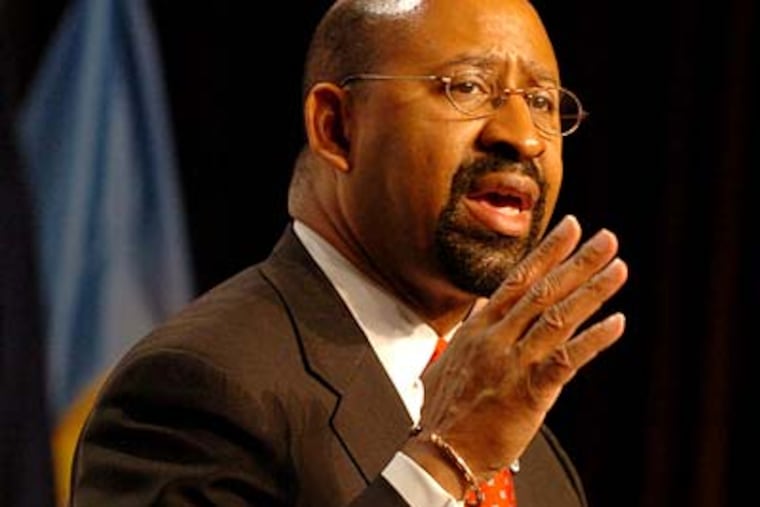John Baer: Philly is No. 1! . . . when it comes to taxes
LET'S TALK taxes. After all, if you live in Philly, you're the highest-taxed folks in America. And in coming weeks, maybe months, you'll hear lots about the need to raise taxes to meet city and state budget deficits.

LET'S TALK taxes.
After all, if you live in Philly, you're the highest-taxed folks in America.
And in coming weeks, maybe months, you'll hear lots about the need to raise taxes to meet city and state budget deficits.
Mayor Nutter, for example, seeks legislative authority to raise the city sales tax from 7 percent to 8 percent starting Aug. 1.
He was at the state Capitol yesterday lobbying for the hike.
Without it, says Nutter, the city faces "massive layoffs" and closure of some city departments; and without it, by Aug. 1, "we will have to start ratcheting back."
Before you yelp about a sales-tax hike, you should know that at 8 percent, Philly still would have the lowest sales tax among the nine American cities with a population of a million-plus.
According to the Sales Tax Clearinghouse, Chicago's first with 10.25 percent, L.A.'s second with 9.25 percent, and New York, Houston, Phoenix, San Antonio, San Diego and Dallas all top 8 percent.
The bad news is that Philly already leads the nation in total tax burden, mostly because so many local and state taxes are flat or regressive.
An annual survey by Washington's Office of Revenue Analysis - mandated by Congress to measure state and local tax burden in the largest city in every state - Philly ranks first.
City Finance Director Rob Dubow said in a written statement yesterday: "Yes, when considering all tax revenue, Philadelphia is the highest-taxed city in the country."
It's followed by Bridgeport, Conn., Detroit and Indianapolis.
The least taxed? Anchorage, Alaska.; Manchester, N.H.; Cheyenne, Wyo., and Seattle.
The survey covers the 2007 tax year. The next survey is due in August. No preliminary findings are being released.
The survey uses a family of three (two wage earners and a school-aged child) to measure taxes at five income levels. Philly tops the list at each level. And the survey supports the view that lower-and middle-income folks get hit hardest, again because of regressive or flat taxes.
For example, Philadelphians making $25,000 to $75,000 a year pay a higher percentage of taxes than those making $100,000 to $150,000.
A Philly family of three making $50,000 pays $8,629 a year in taxes, 17.3 percent of income. A Philly family of three making $150,000 pays $21,955 in taxes, or 14.6 percent.
Nutter says that the city's tax burden is one reason he formed a 15-member task force in February to "completely revamp" tax structure. A report is due in September with hopes of introducing tax changes next year.
Meanwhile, there's a growing sense in Harrisburg that Democrats will push to increase the state personal income tax, which has already risen from 2.8 percent to 3.07 percent during Gov. Rendell's tenure.
Part of the argument is a claim that the tax is the second-lowest among states that levy income taxes.
It's an argument at least partly disingenuous.
Among 43 states with income taxes, only six others levy a flat tax such as Pennsylvania's. Among those, we're second-lowest to Illinois.
But among states with graduated income taxes, the low-end rate in 25 states is lower than Pennsylvania's flat rate.
Ron Alt, senior research associate at the Washington-based Federation of Tax Administrators, a nonprofit group of state revenue agency officials, says that it's inaccurate to call Pennsylvania second-lowest.
State officials cite the Tax Foundation, a D.C.-based non-profit educational group, which puts Pennsylvania's rate second-lowest, and argue that the tax has exemptions based on income and family size. For example, a married couple with nine dependent children can make up to $98,500 a-year and pay no state income tax.
So if you've had it with taxes you have options: (a) move to Anchorage, or (b) have a bunch of kids. *
Send e-mail to baerj@phillynews.com.
For recent columns, go to